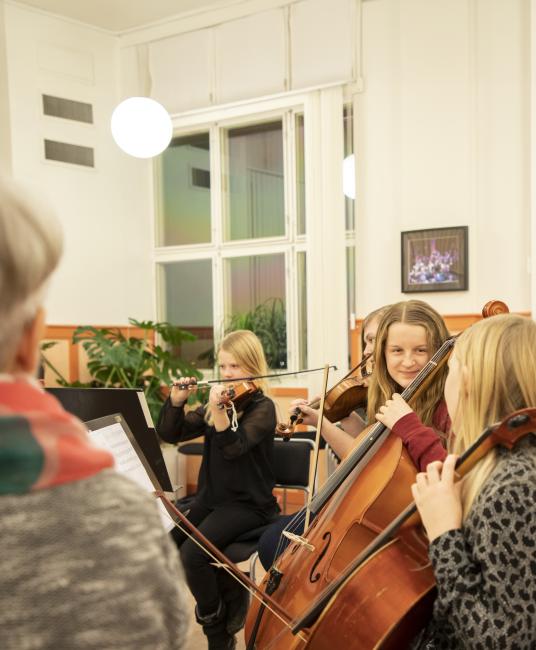About the Music Teacher programme
Karlstad University’s Music Teacher programme is offered by Ingesund School of Music (MHI). Students taking our excellent Music Teacher programme will develop their pedagogical and musical skills simultaneously over the course of the programme. We offer an extraordinary study environment with recently renovated premises, ample practice rooms and skilled teachers who are passionate about music and learning.

Graduates from the Music Teacher programme are qualified to teach music in upper-secondary schools, as well as in years 1–9. The programme also gives you the necessary skills to teach at music or arts schools. When we designed the Music Teacher programme at MHI, we made sure to include music and arts school perspectives, to provide you with more future career opportunities.
Subject combinations
Ingesund School of Music specialises in the music-music subject combination and you will receive tuition in your main instrument in all the semesters on the programme, in one of three genres: folk music, classical music, and rhythm and improvisation.
You also play in different types of ensembles during the programme. There is a big band, a folk music ensemble, a choir, a wind symphony, a string and symphony orchestra, as well as a number of smaller genre ensembles.
To enhance the programme’s practical placements, you also regularly have practice teaching sessions, giving you valuable contacts and professional experience.
Ingesund School of Music offers new and recently renovated premised and ample practice rooms. Our excellent teachers contribute to the quality of the programme.
Programme structure and contents
Music Teacher programme comprises 300 ECTS credits.
- Subject 1, 120 ECTS cr.: Music-specific teaching methodology
- Subject 2, 90 ECTS cr.: Elective
- Instrument and ensemble (IE)
- Music in class (MiK)
- Music theory and composition (MoK)
- Music and sound production (MuLP) - General education core studies (UK), 60 ECTS cr.
- Practical placement (VFU), 30 ECTS cr.
- Independent projects 1 and 2 (15 ECTS cr. each): As part of Subjects 1 and 2
- Overview of the Music Teacher programme
Subject 1: Music-specific teaching methodology
You study your main instrument as part of Subject 1, and you receive tuition in your instrument during all ten semesters of the programme. You also play in different ensembles, study instrument-specific methodology and have practice teaching sessions. During the first two years of the programme, chord and accompaniment instruments are studied, as well as voice and song, choir, rhythm and dance, ear training, music theory, music production and the cultural context of music. You further study general music-specific teaching methodology, group methodology and ensemble methodology. The second of the programme’s independent projects is completed as part of Subject 1.
Subject 2
Before the second year of the programme, you choose Subject 2, a specialisation that will give your degree a specific profile. Each specialisation involves artistic as well as pedagogical development. Read more about the different specialisations below. The first of the programme’s independent projects is completed as part of Subject 2.
Instrument and ensemble (IE)
This specialisation provides in-depth knowledge of instruments and ensembles. Choose a second instrument that you can combine with your first instrument to broaden your knowledge of genres r instruments. You receive tuition in your second instrument and play in an ensemble, and you study instrument-specific methodology and have practice teaching sessions.
The subject further includes music-specific teaching methodology, ensemble methodology, a stage project, ear training, music theory, music production and the cultural context of music, offered in conjunction with other Subject 2 specialisations.
Music in class (MiK)
In this subject, you specialise in music class teaching. You continue to develop your knowledge and skills in chord and accompaniment instruments, voice and song and the cultural context of music. You further study classroom methodology for upper-secondary school and years 1–9, stage different projects and have practice teaching sessions in class.
The subject further includes general music-specific teaching methodology, ensemble methodology, ear training, music theory and music production, offered in conjunction with other Subject 2 specialisations.
Music theory and composition (MoK)
In this subject, you develop your knowledge and skills in ear training, music theory, composition and the cultural context of music. You also learn piano has a chord instrument and methodology for theory and composition, as well as practice teaching sessions.
The subject further includes general music-specific teaching methodology, ensemble methodology, a stage project, and music production, offered in conjunction with other Subject 2 specialisations.
Music and sound production (MuLP)
This subject allows you to specialise in music and sound production. You work with recording, editing and processing of sound and other projects in the area of music production. Subject-specific teaching methodology is integrated into subject teaching and you have practice teaching sessions in this area.
The subject further includes general music-specific teaching methodology, ensemble methodology, a stage project, ear training, music theory and the cultural context of music, offered in conjunction with other Subject 2 specialisations.
General education core studies (UK)
General education core studies (60 ECTS cr.) comprise central and general ideas of teaching that are applied and related to music and music-specific teaching methodology. Studies are thematically organised into two areas: the teaching profession and pedagogical leadership. The first theme includes the history of the school system, its organisation and conditions, as well as development, learning and special needs education. The second theme includes social relations, conflict management and leadership, assessment and grading, evaluation and development work, as well as theory of science and research methodology.
In the study programme, general education core studies alternate with and are integrated into music studies and music-specific teaching methodology, as well as the practical placements (VFU), to provide a good foundation for a future professional identity. Students on the Music Teacher programme take these courses in Arvika, at Ingesund School of Music.
Practical placement (VFU)
Practical placements take place in different types of schools, such as upper-secondary schools, compulsory schools, music schools and arts schools. During the programme, there are four concentrated practical placements of five weeks each. In addition, you have regular practice teaching sessions to enhance VFU.
Independent projects
As part of your subject studies, you also have to complete two independent projects of 15 ECTS credits each. The first independent project is completed during the third year of the programme, and the second during the last semester of the programme. The aim of these projects is to develop basic knowledge of research and development work that is relevant to your future profession as music teacher. The first project gives you the opportunity to study your own performance and learning processes, and in the second you conduct a study in the area of music-specific teaching methodology


